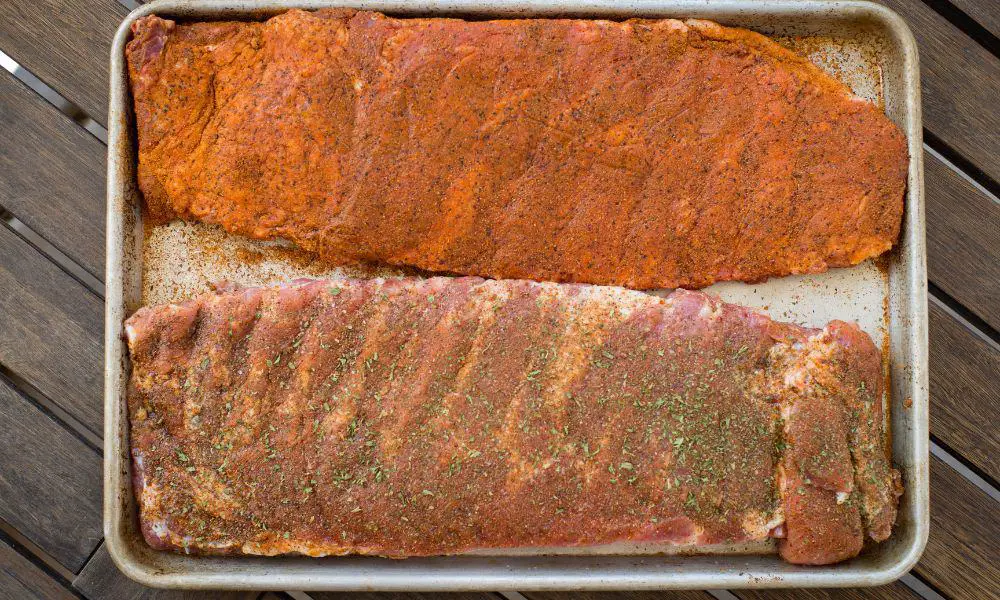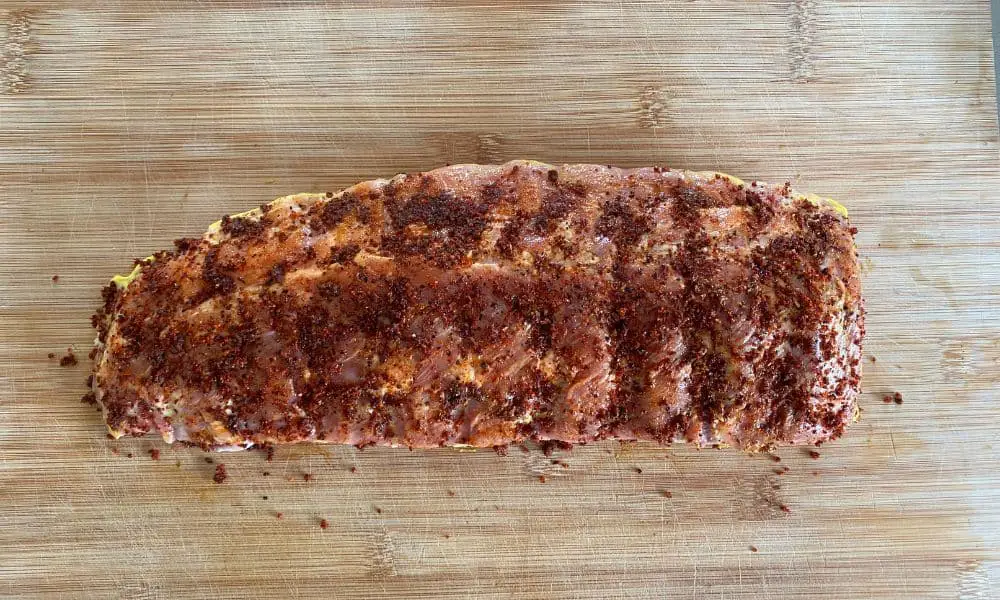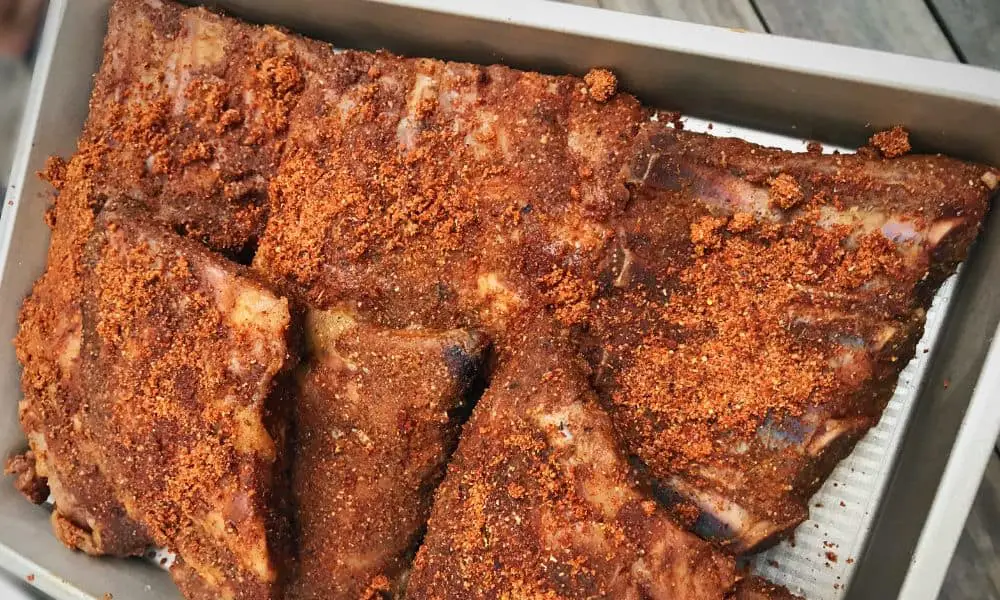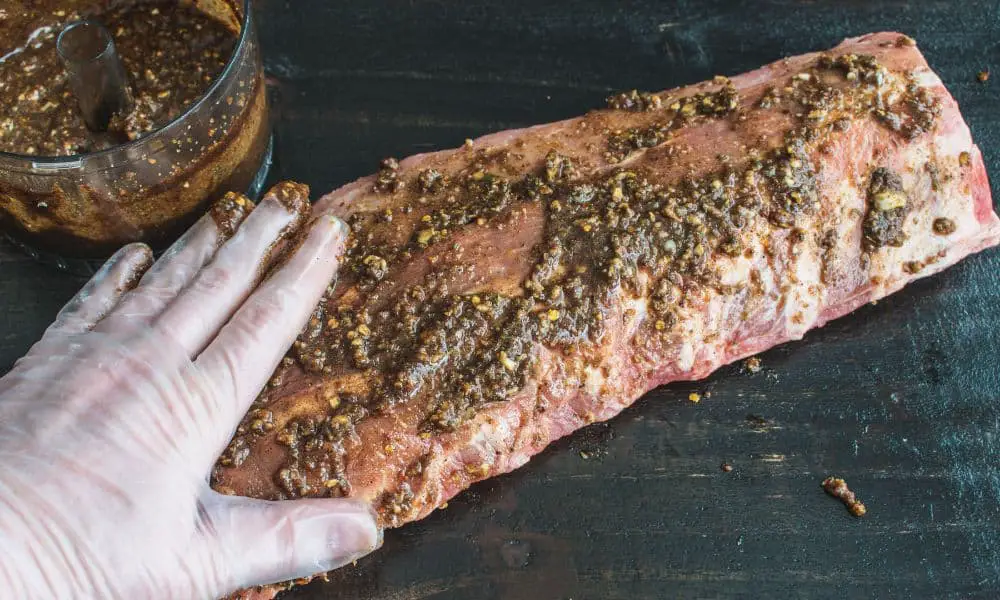Pork ribs are one of the most versatile meats to cook, found in almost any cuisine with their own flavors and styles.
But, one common trend amongst grilling and barbecue enthusiasts is to first apply a savory, sweet, or spicy dry rub before cooking.
But how long should you really leave the dry rub or seasoning on the ribs? Is there a sweet spot or does it not really matter?

You can sit ten pitmasters in a room and they’ll happily argue about almost every part of the cooking process of pork ribs.
So, when it comes to applying your dry rub, there’s really no “right” answer as to how long you should leave it on for.
But, there are a few lengths of time that are more effective and more popular than others.
Leaving dry rub on ribs for between 15 minutes to 2 hours before cooking them tends to produce the best results in terms of flavor penetration and bark formation.
This is because after a while the salt from the dry rub is absorbed into the meat, making it easier for the rib to hold its moisture throughout the entire cooking process. This is the secret behind the infamous brining process for ribs.
Can You Cook Ribs Straight After You Apply Rub?

Whether you’re just impatient or you forgot to start the process earlier, you absolutely CAN cook ribs straight after you apply the rub!
Assuming you’ve used a binder like mustard, the rub will adequately hold to the ribs, almost immediately.
However, one downside to cooking your ribs straight after applying the rub is that the salt in the rub won’t have enough time to be absorbed into the meat, which normally seals in the moisture.
If you can wait for at least 15 minutes, the rub flavors will penetrate deeper, and the moisture from the meat will mix with the rub, which helps create a pretty magnificent bark-like exterior.
Can You Leave Dry Rub On Ribs Overnight?

With many types of meat, marinating them overnight certainly enhances the flavor. Allowing enough time for the salts, sugars, and all of the flavor to penetrate deep into the meat.
So what about dry rubs? Does it work the same way?
You absolutely can leave dry rub on your ribs overnight and it will enhance the flavor and allow enough time for any dry brining effects to take place to seal in that moisture.
But, it’s absolutely not necessary to leave dry rub on your ribs for this long of a time, as many find that 2 hours is just as effective.
What’s more, if you’re using an extra salty rub, then any longer than about 12-16 hours and you might find that the ribs become overly salty, and you may find it can even ruin the texture of the ribs too!
What Does Rub/Seasoning Do To The Ribs?
We all know that a good rub delivers the salty, savory, sweet, tangy, or spicy flavors that go hand in hand with deliciously smoked or grilled pork ribs.
But, have you ever thought about what the rub or seasoning ACTUALLY does to the ribs?
Well, you might have guessed it, but many different elements of the rub affect the ribs in rather unique ways:
- Salt: Salt penetrates into the meat and is absorbed in the proteins, helping them retain their natural juices.
- Pepper: Pepper is a unique spice in that it adds a bit of heat, without being considered spicy. Pepper is also great at adding color and texture to the crust or bark.
- Spices: Spices such as paprika, chili powder, or cumin, play a huge part in influencing the flavor of the bark of the ribs. Not to mention they add a very attractive color to the ribs too.
- Herbs: Herbs in dry rubs are great for adding a pleasant scent and herbaceous smell to your ribs.
All of these aspects put together in a classic dry rub make for an incredible taste, texture, appearance, and experience.
What Rubs/Seasonings Should You Use For Ribs?
I’m not going to sit here and tell you what you must do. That’s the beauty of cooking ribs, there are 100s of different flavors and countless different styles.
But, what you’ll find between different cuisines is that seasoning ribs often fall into two categories.
The first is where you season your ribs with the basics: a simple salt and pepper rub. This really highlights the flavor of the pork itself and allows for other flavors to shine like the smokiness if you’re smoking your ribs for example.
On the other hand, if you’re looking to create something truly delicious and packed full of flavor, then you can choose to use a sweet, savory, spice, or tangy rub.
These usually have a mix of salt, pepper, paprika, garlic powder, and onion powder, and can have a handful of other herbs and essential spices too.
I would recommend trying one of each style at least once in your rib cooking journey. You’ll surely end up with a favorite, but this way you can build a more broad profile and understand the flavors that much better.
How To Apply Rubs To Ribs
Whether you’re using a simple salt and pepper rub, one you’ve made yourself, or even a store-bought rub, the best way to apply it to your pork ribs is the same:
- Remove the membrane from the underside of your ribs. This can be done by sliding a butter knife under it and pulling it up, or getting a grasp on it with a paper towel.
- Generously apply a binder like mustard to the entire exterior of your ribs, including the underneath and sides.
- Begin sprinkling a generous and even coating of your seasoning or rub of choice to one side of the ribs.
- Using one hand (so you can keep your other hand clean) thoroughly rub in the seasoning all over the ribs, including the sides.
- Flip your ribs over and repeat the generous seasoning and rubbing in!
- Depending on your patience and how much time you have up your sleeve, store your ribs back in the fridge and wait anywhere from fifteen minutes, to two hours, to overnight.
- If you don’t have the time, you can go ahead and start cooking your ribs immediately.
Note: Take your ribs out of the fridge about 15 minutes before you think you’ll start to cook them, so they can come up to room temperature and cook more evenly!
For more information on the entire cooking process, check out how to smoke ribs at 275°F.
How Long To Leave Wet Rub/Marinades On Ribs

A wet rub or a marinade works in a similar way to dry rubs. The aim is either to infuse as much flavor into the rib as possible or to tenderize the rib ahead of the cooking process.
However, how long you should leave the wet rub/marinade on your ribs depends on what it’s made out of!
Any wet rub or marinade that contains vinegar should only be left on your ribs for between two and four hours. This is because vinegar is extremely acidic, and if left too long on ribs can over-tenderize them – plus it’s a rather potent flavor.
If you are using a yogurt-based marinade or a nonacidic wet rub then you can safely leave it on your ribs for anywhere from two to 24 hours.
That’s It!
So there you have it.
You should leave your dry rub on your ribs for around 15 minutes to 2 hours before cooking them to allow the flavors to soak in, and the salt to be absorbed into the meat – helping things stay moist!
Of course, you can cook your ribs right away after applying your rub, and you can leave them overnight to absorb even more of that delicious flavor from the rub.
This goes for using a simple salt and pepper rub, a homemade rub, to a store-bought one.
At the end of the day, it’s your choice and you can find success no matter how long you wait to cook your ribs after you’ve applied your rub!


